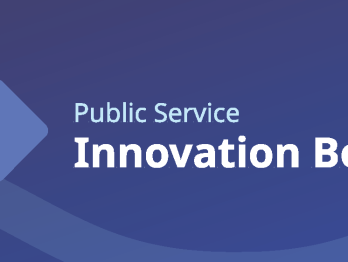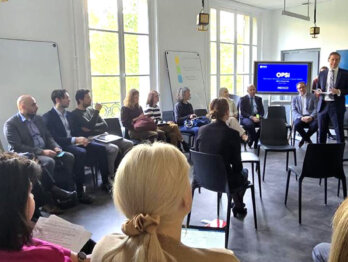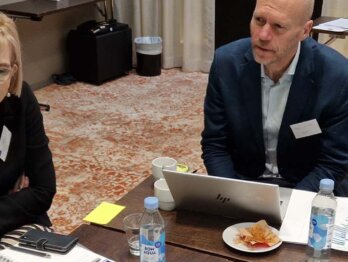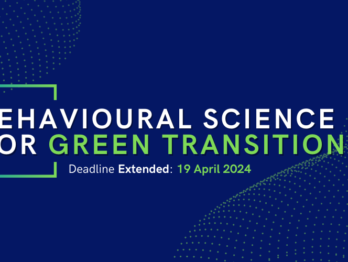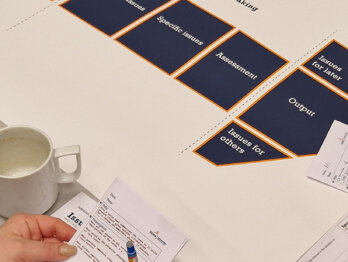Spotting the sludge: Behavioural audits to improve public services across countries

According to the 2021 OECD Trust Survey, a majority of citizens are satisfied with their government’s delivery of public services. However, they also think there is little chance of a service being improved if people complained. OECD countries have already committed to Building Trust and Reinforcing Democracy through a broad set of actions to respond to some of the key governance challenges. One of the ways to do this is to improve government services, through a Recommendation developed by the OECD, which seeks to assist governments in making their public services more efficient, equitable, and user-friendly.
The OECD is exploring the huge contribution that behavioural science can make to service design by partnering with the Government of New South Wales (NSW) in Australia on an ‘International Sludge Academy’. Whether it’s applying for a business permit or seeking financial relief after a disaster, an administrative service is an interplay of individual choices and actions involving citizens, public servants, and often other stakeholders. Focusing on these specific human behaviours, and the drivers and barriers to those behaviours, can pinpoint service problems and motivate practical solutions.
What is sludge?
Behavioural science interventions can help reduce ‘sludge’: unjustified frictions in citizens’ interactions with government. Complex forms, stigmatising language, unnecessary steps, and unexplained waits are all examples of sludge. These practical, emotional, or social barriers make it harder and slower for people to fulfil their intentions, progress their plans, and access their entitlements. They impose a ‘time tax’ on citizens, businesses, and the public administration itself. The concept of ‘sludge’ puts a behavioural lens on a conversation that has previously been focused on administrative burdens, on the one hand, or on user experience, on the other. Grounding our analysis in specific human behaviours helps to bring those perspectives together, by identifying problems, quantifying them, and suggesting solutions.
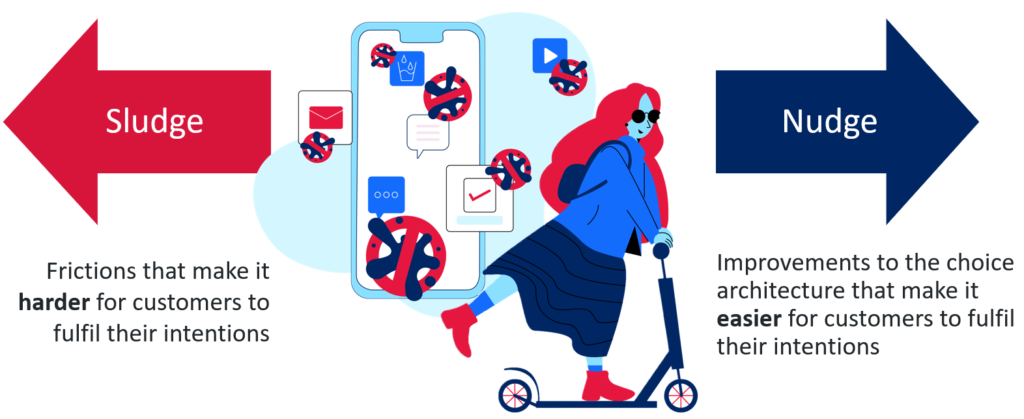
Reducing sludge has gained a lot of attention in conversations with the OECD’s Network of Behavioural Insights Experts in Government, which brings together over 150 government behavioural scientists from over 50 countries. Some of the most advanced work is happening in the NSW Government. The NSW team decided to lead a conversation with international colleagues about how best to spot and tackle sludge in public services.
The International Sludge Academy
The NSW Behavioural Insights Unit, located in the NSW Department of Customer Service, has developed a robust and mature method for ‘sludge audits’: structured behavioural assessments of a service or process. Many aspects of the NSW method are available online, including practical, comprehensive guides on how to design websites, forms, letters, text messages, and apps with a user’s behaviour in mind.
The OECD has convened the first International Sludge Academy as a forum for our NSW colleagues to coach other interested countries in the use of their sludge audit method, and for international colleagues to tailor and improve the method by testing it in diverse jurisdictions. 16 teams from 14 countries are actively conducting sludge audits – with access to mentors and tools from the NSW Behavioural Insights Unit – and many other countries are participating as observers. Through a process of mentoring and shared learning we’re identifying ways that sludge audits can be conducted effectively in a wide variety of contexts.
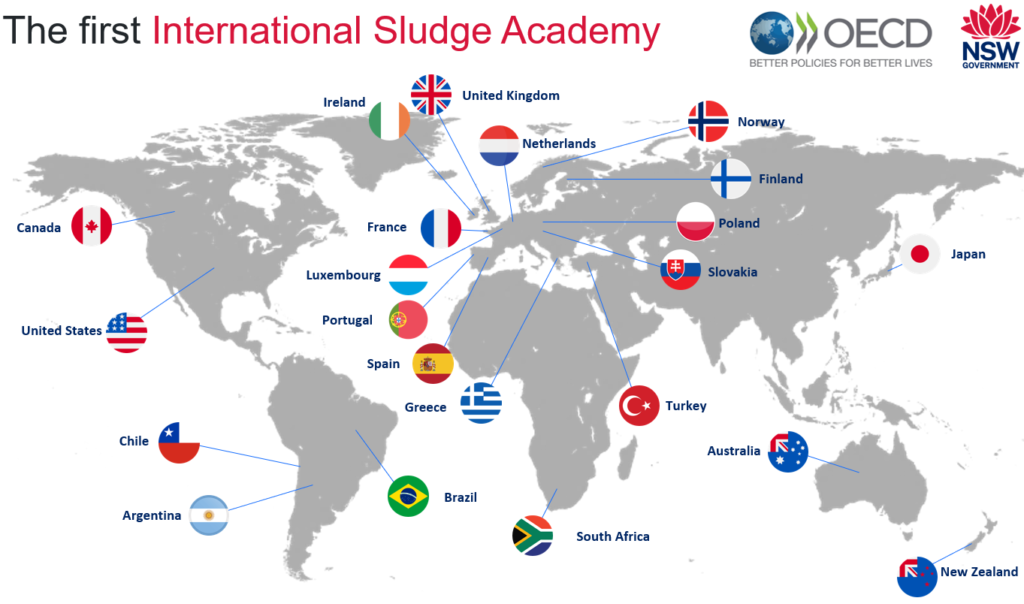
Teams are applying a behavioural lens to widely differing services, reflecting the complex array of ways that governments interact with their citizens and stakeholders. Many are assessing services for external parties like citizens, businesses, and even other government agencies (such as business grants and householder subsidies). Other teams have turned their gaze inward, looking for sludge in the internal operations of their government (such as recruitment processes or regulatory impact assessments).
By developing new ways to quantify the unintended frictions that exist in government programs and services, we are paving a measurable path towards impactful solutions that support better outcomes for British Columbians.
BC Behavioural Insights Group, Government of British Columbia
Steps in a sludge audit
International Sludge Academy teams have used the NSW Government sludge audit method. They began by creating a behavioural journey map: a detailed list of all of the actions people take to find the service, begin, and eventually reach a resolution. They then estimated the time taken at each step, and scored the user experience of each step using rubrics tailored to each type of behaviour (such as ‘gather documents’ or ‘navigate website’).
Teams are also identifying barriers to access and equity, by considering factors such as the psychological costs at each step in the journey (such as embarrassment, exclusion, distrust, or anxiety), accessibility barriers, and how the journey itself differs for different groups in society. In a great example from outside the Academy, researchers in the United States increased take‑up of a rental assistance programme among Black and African-American households by de‑stigmatising the language used to promote it (such as changing “a staff member will determine if you’re eligible” to “a staff member will help you determine if you’re eligible”).
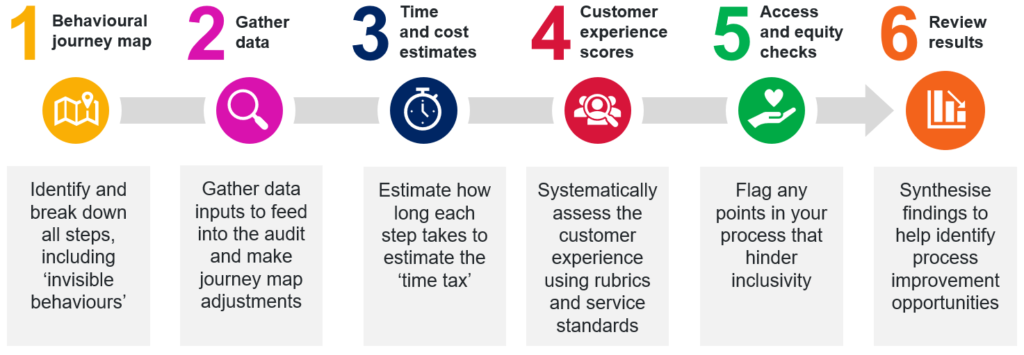
Mapping the behavioural journey and deconstructing an administrative process into specific actions undertaken by individuals provided us with a valuable opportunity to objectively observe and quantify the complexity of the process and identify operational improvement areas.
French behavioural insights team at the Interministerial Directorate for Government Transformation (DITP)
Savings for society, savings for government
The NSW Government has achieved cost savings, customer benefits, and equity improvements by applying their sludge audit method to their government’s public services. Two examples that illustrate the impact include:
- Sludge audits on application processes identified hours of cost savings for both applicants and NSW Government staff.
- Interventions informed by an audit increased the number of children attending key health checks by 24% and significantly increased families accessing information and resources online.
CINCO, the Brazilian Behavioral Insights Unit, has embarked on a collaboration with its sister Secretariat of Digital Government in the Ministry of Management and Innovation aiming to audit the “gov.br” digital account recovery process, an essential gateway to approximately 4,800 federal digital services. With over 105 million recovery requests each year, 97% of cases are efficiently handled through automation. Yet, certain barriers persist, primarily affecting the most vulnerable groups, especially in the context of the form-based recovery procedure.
Government official from Brazil
Get involved
The International Sludge Academy is currently underway and we look forward to sharing our lessons learned in coming months. In the meantime, if you would like to know more, feel free to contact us at [email protected]

